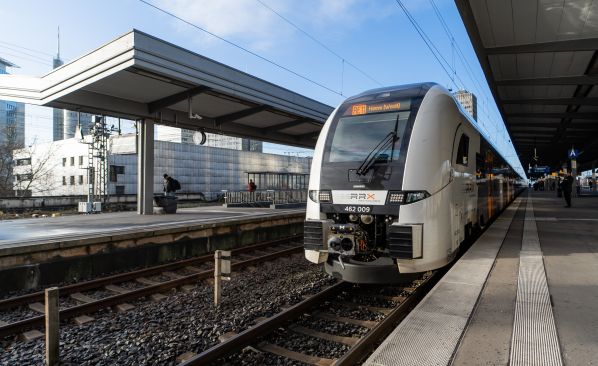CAF was selected on June 24 by Rhine Ruhr Transport Association (VRR) and Westfalen-Lippe Local Transport (NWL) as preferred bidder for a contract to supply more than 60 battery-powered EMUs. After a 10-day objection period, CAF will be awarded the contract for the supply of the trains together with a 30-year maintenance and availability contract.
The tender for the trains was started by VRR and NWL in 2018 and involved several rounds of negotiation with bidders. The trains are being procured under the so-called NRW RRX vehicle financing model developed for North Rhine-Westphalia. “In a Europe-wide negotiation process, a contract partner is sought which not only delivers the vehicles but also maintains them for over 30 years,” say VRR and NRW.
The CAF train will combine a conventional EMU with battery operation on non-electrified lines. The batteries will be charged from the overhead catenary.
With the switch to electric traction, the amount of diesel train kilometers operated for local rail services in the VRR area will drop to less than 10%.
“If we were to use diesel vehicles again on the lines of the network, they would emit around 24,000 tonnes of CO2 per year,” says VRR board spokesman Mr Ronald Lünser. “The new electric vehicles are not only quieter, they also do not emit any fine dust or nitrogen oxides.”
“With this forward-looking vehicle technology, we are making a significant contribution for climate protection and offer an environmentally friendly incentive to switch from private cars to rail,” says NWL managing director, Mr Joachim Künzel. “This brings us closer to our goal of gradually dispensing with diesel vehicles in the NWL area in the coming years”
The EMUs will have multi-purpose areas for wheelchairs, bicycles and strollers which can be reached at ground level from 76cm high platforms. The trains will also be fitted with folding tables, sockets, and Wi-Fi.
The trains will be delivered in two sizes. One fleet will have 120 seats while the other will have 160 seats, both of which will boost capacity on the Lower Rhine-Münsterland network.
Introducing these new, longer EMUs will also involve infrastructure work on the network that will include signalling modifications, extending and raising platforms, and expanding station car parks. A new service is planned between Geldern, Krefeld and Neuss, while trains will run on the Lower Rhine line which will be reopened to Kamp-Lintfort and connect the university to the local rail network.
The Lower Rhine-Münsterland network comprises seven lines with over 6 million train-km per year:
- RE 10 Kleve - Geldern - Krefeld - Düsseldorf
- RE 14 Essen - Bottrop - Dorsten - Borken/Coesfeld
- RE 44 Kamp-Lintfort - Moers - Duisburg - Oberhausen - Bottrop
- RB 31 Xanten - Moers - Duisburg
- RB 36 Oberhausen - Duisburg-Ruhrort
- RB 41 Geldern - Krefeld - Neuss, and
- RB 43 Dortmund - Herne - Dorsten.
The future operators of these lines are being sought in a separate tender process and will be provided with the new trains. The RE 44, RB 31 and RB 36 lines will start operating in December 2025, with the remaining lines following successively up to December 2028.
For detailed data on fleet orders from around the world, subscribe to IRJ Pro.

